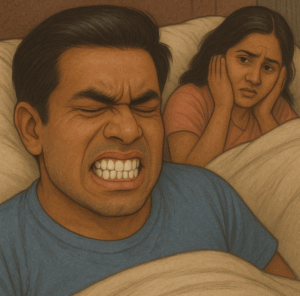Bruxism: Causes, Symptoms, Diagnosis, and Effective Management
 Grinding or clenching your teeth while you sleep may seem harmless, but over time it can damage teeth, strain jaw muscles, and even disturb your sleep. This condition is called bruxism, and it affects both children and adults. Understanding the causes, diagnosis, and management of bruxism is the first step toward protecting your smile and improving your quality of life.
Grinding or clenching your teeth while you sleep may seem harmless, but over time it can damage teeth, strain jaw muscles, and even disturb your sleep. This condition is called bruxism, and it affects both children and adults. Understanding the causes, diagnosis, and management of bruxism is the first step toward protecting your smile and improving your quality of life.
What Is Bruxism?
Bruxism is the medical term for involuntary grinding, clenching, or gnashing of teeth. It can happen:
-
During the day → called awake bruxism, often linked to stress or concentration.
-
During sleep → called sleep bruxism, considered a sleep-related movement disorder.
Many people are unaware they grind their teeth until a dentist notices worn enamel, or a partner hears the grinding at night.
Causes of Bruxism
Bruxism is multifactorial, meaning it arises from several overlapping triggers:
-
Stress and Anxiety
-
The most common cause. Tension often leads to unconscious jaw clenching.
-
-
Sleep Disorders
-
Conditions like obstructive sleep apnea (OSA) increase the risk.
-
Disturbances in dopamine pathways also play a role.
-
-
Dental and Jaw Alignment Issues
-
Malocclusion (crooked teeth, bite problems) may contribute.
-
-
Medications and Substances
-
SSRIs, stimulants, nicotine, alcohol, and caffeine can worsen bruxism.
-
-
Neurological Conditions
-
Seen in Parkinson’s disease, Huntington’s disease, or after head trauma.
-
Symptoms of Bruxism
-
Teeth grinding sounds (often reported by a partner)
-
Worn or flattened teeth
-
Tooth sensitivity or pain
-
Jaw muscle tightness or enlargement
-
Morning headaches
-
Clicking or pain in the jaw joint (TMJ disorder)
-
Poor sleep quality or daytime fatigue
Diagnosis of Bruxism
A dentist or sleep specialist usually diagnoses bruxism through:
-
History → asking about grinding, stress, or sleep habits
-
Examination → checking for tooth wear, jaw muscle tension, or TMJ problems
-
Polysomnography (sleep study) → in severe cases, to confirm sleep bruxism and rule out sleep apnea
How Is Bruxism Managed?
1. Lifestyle and Stress Reduction
-
Practice relaxation techniques, meditation, or yoga
-
Maintain proper sleep hygiene (regular bedtime, avoid late caffeine/alcohol)
-
Increase awareness of daytime jaw clenching and consciously relax the jaw
2. Dental Treatments
-
Occlusal splints/night guards → protect teeth and reduce strain
-
Corrective dental work if bite alignment is contributing
3. Medical Treatments
-
Botulinum toxin (Botox) injections in severe bruxism to relax jaw muscles
-
Short-term use of muscle relaxants in resistant cases
-
Review and adjust medications that may worsen grinding
4. Treat Underlying Conditions
-
Screening and treatment for sleep apnea
-
Managing anxiety or depression with appropriate therapy
Can Bruxism Be Cured?
There is no “one-size-fits-all cure,” but with proper treatment, bruxism can be well controlled. Early diagnosis prevents complications such as:
-
Tooth fractures and enamel loss
-
Gum recession
-
Chronic jaw pain or TMJ dysfunction
-
Poor sleep quality and fatigue
The Bottom Line
Bruxism is more than just a habit—it’s a condition that affects dental health, sleep, and overall well-being. With a combination of stress management, dental protection, medical care, and lifestyle changes, most people can significantly reduce symptoms and protect their teeth for the long term.
About Me
I’m Dr. Srinivas Rajkumar T, Consultant Psychiatrist, researcher, and writer with a keen interest in psychopharmacology and holistic approaches to mental health. I frequently write about the mind–body connection, sleep, and lifestyle strategies for better well-being.
💻 Read more at srinivasaiims.com
📞 For consultations, contact: 8595155808